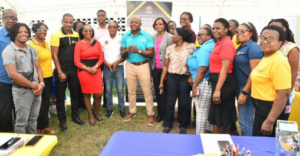Reimagining Jamaica’s education for a STEM future
Prime Minister Andrew Holness recently announced plans to finance the construction of six science, technology, engineering, and mathematics (STEM) schools across the country. This disclosure was made during the annual Primary Exit Profile (PEP) awards function held at the Jamaica House banquet hall on Thursday, August 29, 2024.
Prime Minister Holness has repeatedly spoken about these STEM schools operating under a “new scheme of management” outside of the current Education Act. This has caused me, as someone who volunteers on numerous school boards, to ponder: What about the “Blue Book”, a common term for the 1980 education regulations that seems to inhibit the achievement of these STEM objectives?
I would like to suggest to education policymakers, school boards, and school principals that we reconsider our existing educational model. It may be that the model itself needs to be changed in order to meet the elusive, yet crucial, targets for STEM education.
Allow me to present two educational models, Studio School Model rooted in the UK and the other High Tech High (HTH) model largely in the USA for comparison with Traditional Jamaican educational model, which is a legacy of the UK, but in the UK it has undergone many transformations.
High Tech High (HTH) Model
Philosophy: Emphasises project-based learning (PBL), whereby students engage in interdisciplinary projects that develop critical thinking, creativity, and collaboration. The focus is on preparing students for real-world challenges through hands-on learning.
Curriculum: Flexible and student-centred, with projects integrating various subjects (STEAM). Assessment is based on project quality and presentations rather than standardised tests.
Learning Environment: Encourages creativity, innovation, and community engagement, with students often working on projects that impact their local community.
The Studio School Model
Philosophy: Combines academic learning with vocational training and real-world work experience. This model is designed to prepare students for direct entry into the workforce by providing practical skills alongside traditional education.
Curriculum: Strong emphasis on work placements and career-oriented projects. Students engage in hands-on learning that is directly applicable to their future employment.
Learning Environment: Focuses on employability skills, such as teamwork, communication, and problem-solving, alongside academic achievements.
Traditional Jamaican Educational System
Philosophy: Predominantly academic and exam-focused. The system is designed to prepare students for standardised exams at various levels – Grade Six Achievement Test (GSAT); Primary Exit Profile (PEP); Caribbean Secondary Education Certificate (CSEC); Caribbean Advanced Proficiency Examination (CAPE) – that determine their educational and career pathways.
Curriculum: Rigid and content-heavy, with a strong emphasis on rote memorisation, especially in core subjects like mathematics, English, science, and social studies. Vocational training is typically separated from academic tracks, offered mainly in technical high schools and specialised institutions.
Learning Environment: Traditional classroom-based instruction with a teacher-centred approach. The emphasis is on discipline, structure, and performance in exams, with limited opportunities for creative, interdisciplinary, or project-based learning.
Student Population and Access
High Tech High: Serves a diverse student population through a lottery-based admission system. It aims to reflect the diversity of the community and provides equitable access to innovative education.
The Studio School: Targets students aged 14-19 who may not thrive in traditional academic settings, offering an alternative that blends academic and vocational education. The focus is on students who prefer hands-on, practical learning experiences.
Traditional Jamaican education system: The system is stratified, with students placed in schools based on performance in national exams, such as PEP. High-performing students attend prestigious traditional high schools, while others may attend non-traditional or technical schools. Access to quality education can be uneven, with significant disparities between urban and rural areas as well as among different school types.
Our Jamaican education system is heavily focused on standardised exams (PEP, CSEC, CAPE). Students’ futures are largely determined by their performance in these exams, which influence their access to higher education and career opportunities. Outcomes vary, with some students excelling academically and others struggling in a system that may not cater to diverse learning styles, resulting in only 18 per cent of the over 38,000 student cohort achieving matriculation to tertiary institutions based on the 2024 Caribbean Examinations Council exam results.
The system faces challenges such as overcrowded classrooms, limited resources, and disparities in access to quality education. The heavy emphasis on exams can lead to high stress among students as outlined by the new Jamaica Teachers’ Association President Dr Mark Smith at his installation last month. Our system may not adequately prepare our students for real-world challenges. Additionally, there is a need for greater integration of vocational training and life skills into the curriculum.
The Studio School and High Tech High models represent innovative approaches to education that prioritise hands-on, experiential learning, and real-world applications. These models contrast sharply with the traditional Jamaican education system, which is more rigid, exam-focused, and less adaptable to the diverse needs and interests of students.
While the Jamaican system has strengths in academic rigour and discipline, it could benefit from incorporating elements of project-based learning, vocational training, and personalised education seen in models like High Tech High and the Studio School. This could help better prepare students for the modern workforce and create a more inclusive, equitable education system.
Denworth Finnikin is a university lecturer. Send comments to the Jamaica Observer or denworth.finnikin@gmail.com.












